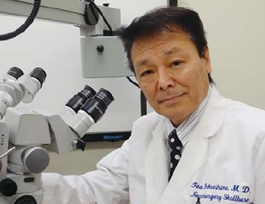
Takanori Fukushima, M.D., D.M.Sc., received his postgraduate training in neurosurgery at the University of Tokyo Hospital, the Free University of Berlin, and the Mayo Clinic and Mayo Graduate School of Medicine in Rochester, Minnesota.
Dr. Fukushima is internationally renowned for his research and clinical work in the treatment of skull base tumors, aneurysms, hemifacial spasm, trigeminal neuralgia and arteriovenous malformations of the brain, as well as pituitary disorders.
He was formerly a Professor of Neurosurgery at the University of Southern California in Los Angeles. More recently he has served as Professor and Vice-Chair of the Department of Neurosurgery at the Allegheny Neuroscience Institute, and Director of the Center for Skull Base Surgery in Pittsburgh.
Dr. Fukushima is currently consulting Professor of Neurosurgery at Duke University Medical Center.
He is an honorary professor at the Karolinska Institute in Stockholm, the University of Frankfurt and the University of Marseille.
As an innovator, Dr. Fukushima has few peers. A pioneer in the 1960s of minimally invasive approaches in neurosurgery, he established a technique called keyhole craniotomy for endoscopic brain tumor removal. Since then he has employed keyhole surgery in more than 5,500 cases to treat hemifacial spasm, trigeminal neuralgia, and glossopharyngeal neuralgia. He developed the first flexible neuroendoscope, several microsurgical instruments and an eponymous technique for skull base carotid bypass surgery.
